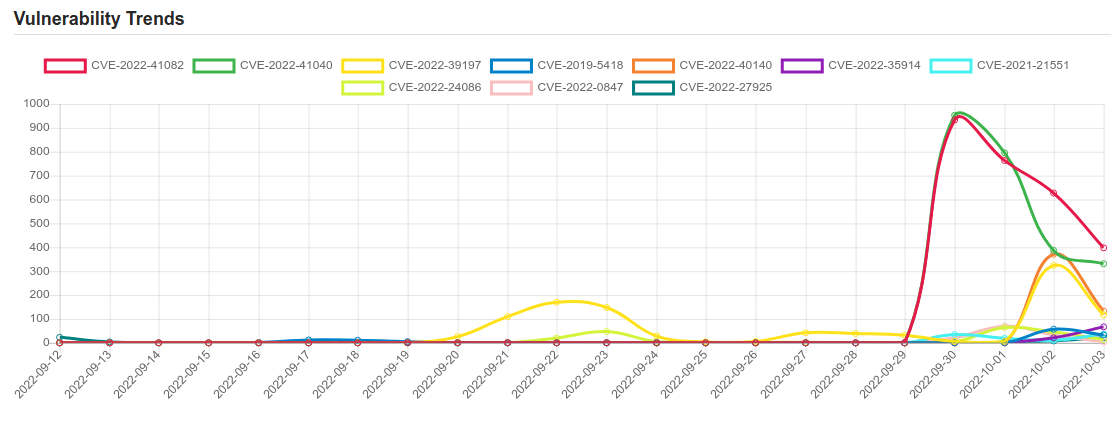Daily Vulnerability Trends: Tue Oct 04 2022

| CVE NAME | CVE Description |
| CVE-2022-0847 | A flaw was found in the way the “flags” member of the new pipe buffer structure was lacking proper initialization in copy_page_to_iter_pipe and push_pipe functions in the Linux kernel and could thus contain stale values. An unprivileged local user could use this flaw to write to pages in the page cache backed by read only files and as such escalate their privileges on the system. |
| CVE-2022-27925 | Zimbra Collaboration (aka ZCS) 8.8.15 and 9.0 has mboximport functionality that receives a ZIP archive and extracts files from it. An authenticated user with administrator rights has the ability to upload arbitrary files to the system, leading to directory traversal. |
| CVE-2022-37042 | Zimbra Collaboration Suite (ZCS) 8.8.15 and 9.0 has mboximport functionality that receives a ZIP archive and extracts files from it. By bypassing authentication (i.e., not having an authtoken), an attacker can upload arbitrary files to the system, leading to directory traversal and remote code execution. NOTE: this issue exists because of an incomplete fix for CVE-2022-27925. |
| CVE-2022-36804 | Multiple API endpoints in Atlassian Bitbucket Server and Data Center 7.0.0 before version 7.6.17, from version 7.7.0 before version 7.17.10, from version 7.18.0 before version 7.21.4, from version 8.0.0 before version 8.0.3, from version 8.1.0 before version 8.1.3, and from version 8.2.0 before version 8.2.2, and from version 8.3.0 before 8.3.1 allows remote attackers with read permissions to a public or private Bitbucket repository to execute arbitrary code by sending a malicious HTTP request. This vulnerability was reported via our Bug Bounty Program by TheGrandPew. |
| CVE-2022-34691 | Active Directory Domain Services Elevation of Privilege Vulnerability. |
| CVE-2021-44228 | Apache Log4j2 2.0-beta9 through 2.15.0 (excluding security releases 2.12.2, 2.12.3, and 2.3.1) JNDI features used in configuration, log messages, and parameters do not protect against attacker controlled LDAP and other JNDI related endpoints. An attacker who can control log messages or log message parameters can execute arbitrary code loaded from LDAP servers when message lookup substitution is enabled. From log4j 2.15.0, this behavior has been disabled by default. From version 2.16.0 (along with 2.12.2, 2.12.3, and 2.3.1), this functionality has been completely removed. Note that this vulnerability is specific to log4j-core and does not affect log4net, log4cxx, or other Apache Logging Services projects. |
| CVE-2022-42003 | No description provided |
| CVE-2022-26134 | In affected versions of Confluence Server and Data Center, an OGNL injection vulnerability exists that would allow an unauthenticated attacker to execute arbitrary code on a Confluence Server or Data Center instance. The affected versions are from 1.3.0 before 7.4.17, from 7.13.0 before 7.13.7, from 7.14.0 before 7.14.3, from 7.15.0 before 7.15.2, from 7.16.0 before 7.16.4, from 7.17.0 before 7.17.4, and from 7.18.0 before 7.18.1. |
| CVE-2022-42004 | No description provided |
| CVE-2022-20916 | A vulnerability in the web-based management interface of Cisco IoT Control Center could allow an unauthenticated, remote attacker to conduct a cross-site scripting (XSS) attack against a user of the interface. This vulnerability exists because the web-based management interface does not properly validate user-supplied input. An attacker could exploit this vulnerability by persuading a user of the interface to click a crafted link. A successful exploit could allow the attacker to execute arbitrary script code in the context of the affected interface or access sensitive, browser-based information. |
| CVE-2022-30190 | Microsoft Windows Support Diagnostic Tool (MSDT) Remote Code Execution Vulnerability. |
| CVE-2021-43980 | The simplified implementation of blocking reads and writes introduced in Tomcat 10 and back-ported to Tomcat 9.0.47 onwards exposed a long standing (but extremely hard to trigger) concurrency bug in Apache Tomcat 10.1.0 to 10.1.0-M12, 10.0.0-M1 to 10.0.18, 9.0.0-M1 to 9.0.60 and 8.5.0 to 8.5.77 that could cause client connections to share an Http11Processor instance resulting in responses, or part responses, to be received by the wrong client. |
| CVE-2022-41082 | No description provided |
| CVE-2022-41040 | No description provided |
| CVE-2022-39197 | An XSS (Cross Site Scripting) vulnerability was found in HelpSystems Cobalt Strike through 4.7 that allowed a remote attacker to execute HTML on the Cobalt Strike teamserver. To exploit the vulnerability, one must first inspect a Cobalt Strike payload, and then modify the username field in the payload (or create a new payload with the extracted information and then modify that username field to be malformed). |
| CVE-2019-5418 | There is a File Content Disclosure vulnerability in Action View <5.2.2.1, <5.1.6.2, <5.0.7.2, <4.2.11.1 and v3 where specially crafted accept headers can cause contents of arbitrary files on the target system's filesystem to be exposed. |
| CVE-2022-40140 | An origin validation error vulnerability in Trend Micro Apex One and Apex One as a Service could allow a local attacker to cause a denial-of-service on affected installations. Please note: an attacker must first obtain the ability to execute low-privileged code on the target system in order to exploit this vulnerability. |
| CVE-2022-35914 | /vendor/htmlawed/htmlawed/htmLawedTest.php in the htmlawed module for GLPI through 10.0.2 allows PHP code injection. |
| CVE-2021-21551 | Dell dbutil_2_3.sys driver contains an insufficient access control vulnerability which may lead to escalation of privileges, denial of service, or information disclosure. Local authenticated user access is required. |
| CVE-2022-24086 | Adobe Commerce versions 2.4.3-p1 (and earlier) and 2.3.7-p2 (and earlier) are affected by an improper input validation vulnerability during the checkout process. Exploitation of this issue does not require user interaction and could result in arbitrary code execution. |
A considerable amount of time and effort goes into maintaining this website, creating backend automation and creating new features and content for you to make actionable intelligence decisions. Everyone that supports the site helps enable new functionality.
If you like the site, please support us on Patreon using the button below

To keep up to date follow us on the below channels.




![Cobalt Strike Beacon Detected - 139[.]155[.]239[.]97:80 6 Cobalt-Strike](https://www.redpacketsecurity.com/wp-content/uploads/2021/11/Cobalt-Strike-300x201.jpg)
